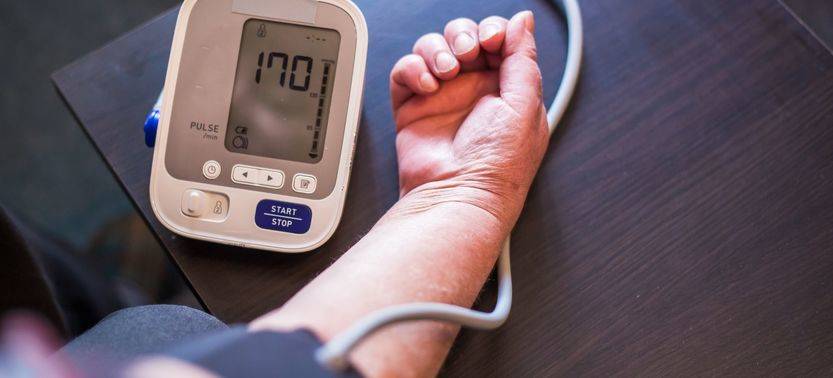Hard Truths About High Blood Pressure Risks
You’re probably aware that high blood pressure, also known as hypertension, can be dangerous, increasing your risk for heart disease, stroke, kidney disease, eye problems, and heart failure. But what exactly causes high blood pressure in older adults? And why does it increase with age?

You’re probably aware that high blood pressure, also known as hypertension, can be dangerous, increasing your risk for heart disease, stroke, kidney disease, eye problems, and heart failure. But what exactly causes high blood pressure in older adults? And why does it increase with age?
Blood pressure is generated by the heart beating, causing pressure to push blood through your arteries, veins, and capillaries. There are two numbers used to measure blood pressure. The top number is your systolic pressure, which measures blood being pushed out of the heart and into the arteries. The bottom number, your diastolic pressure, measures the pressure of blood between beats when the heart is resting.
According to the American Heart Association, when blood pressure is too high, the heart and blood vessels work harder and less efficiently. This can cause damage to the arteries and heart and can lead to arrhythmia, heart attack, and stroke.
It turns out that high blood pressure is the most common type of cardiovascular disease among adults in the United States. According to the Centers for Disease Control and Prevention, nearly half of Americans have high blood pressure, and only one in four has it under control. Here’s what you need to know about what causes high blood pressure and how you can manage your risk.
Blood Pressure Can Rise with Age
If you feel your blood pressure is rising as you age, you could be right. Aside from some genetic conditions or secondary hypertension caused by other diseases or health conditions, the main driver of high blood pressure is vascular changes that occur in your heart and blood vessels as you age. As you get older, your blood vessels lose their elasticity and become stiffer. This makes it harder for your heart to push blood through your body, resulting in increased blood pressure.
After the age of 40, it’s important to manage high blood pressure because your risk of the disease increases. This risk goes up more if you have a family history of high blood pressure, have comorbidity factors like obesity, or smoke or drink heavily. There is no cure for hypertension, yet there are ways to manage the condition and reduce the risks to your health.
Normal Blood Pressure Is the Goal
What is considered high blood pressure for an older adult might surprise you. Normal blood pressure reading for adults over 60 years of age is 120/80 mmHg. The high blood pressure range for seniors starts at hypertension stage 1, isolated systolic hypertension, and spans 130-139/80-89 mmHg. It is the most common form of high blood pressure in older adults. If you have isolated systolic hypertension, your doctor might recommend lifestyle changes such as weight loss and exercise, but medication is not usually needed unless the condition worsens. Stage 2 hypertension can put you at high risk for coronary heart disease and require close blood pressure monitoring and diet changes. More severe high blood pressure can lead to a hypertensive crisis that requires immediate medical attention.
Not sure if your blood pressure is normal? Consider these blood pressure guidelines by the American College of Cardiology:
- Normal: <120/<80 mmHg
- Elevated: 120-129/<80 mmHg
- Stage 1 Hypertension: 130-139/80-89 mmHg
- Stage 2 Hypertension: ≥140/≥90 mmHg
- ·Hypertensive Crisis: ≥180/≥120 mmHg
The only way to know if you have high blood pressure is to have your blood pressure tested. Blood pressure can rise without any obvious signs, and many older adults don’t realize they have high blood pressure, which is why it’s commonly referred to as a “silent killer.” For some people, their bodies have adapted to higher pressures over time. Subtle signs of high blood pressure such as dizziness, fainting, fatigue, weakness, and headaches are often ignored as “old age” or are attributed to other health conditions.
Unmanaged high blood pressure wreaks havoc on the body. For example, hypertension is the leading cause of congestive heart failure, and it increases the risk of early death from vascular causes. High blood pressure can cause other problems in your blood vessels, such as narrowing or hardening of the arteries (atherosclerosis). The heart muscle has to work harder to pump against this resistance, which adds to the workload. This continued overwork can lead to heart failure over time.
High blood pressure can also damage kidneys, making it harder for them to regulate fluid and electrolytes. This can lead to problems with balance and movement that affect your quality of life. Blood vessel changes in high blood pressure can also affect your eyesight, leading to distorted or blurred vision or complete loss of sight.
You Can Control Your High Blood Pressure
There is no average age to start high blood pressure medication or to make lifestyle changes. Treatment is based on your risk factors and blood pressure health. For people with high blood pressure, treatment is highly effective and, according to WebMD, has been shown to reduce stroke by an average of 35%-40%, lower heart attacks by 20%-25%, and cut heart failure by more than 50%.
Along with lifestyle and diet changes, your doctor may recommend that you take medication to lower your blood pressure. For example, diuretics or water pills can help kidneys eliminate sodium from the body. Other types of medications like beta blockers can be given to relax the blood vessels and slow your heartbeat. In addition to eating a diet rich in fruits and vegetables, different ways to manage your risk of hypertension include:
- Monitor your numbers. Have your blood pressure measured, and use an in-home monitoring device to check for any changes.
- Stop smoking. Nicotine makes blood vessels narrow and makes your heart beat faster, which can make blood pressure higher.
- Get physically active. Regular exercise can help you regulate your weight and strengthen your heart so it pumps blood with less effort, reducing the force on your arteries and lowering blood pressure.
- Eat healthy. Eat a heart-healthy diet that’s rich in fruits, vegetables, whole grains, and low-fat dairy, and limit high-sodium, high-sugar, high-fat foods.
- Manage stress. Stress can raise adrenaline and cortisol levels in the blood, constricting blood vessels and making the heart beat faster. Embrace stress management techniques to reduce tension in your body.
- Limit alcohol. It’s a myth that a glass of red wine is good for your heart. Any amount of alcohol can cause blood vessels to constrict and raise blood pressure. If you consume alcohol, the American Heart Association recommends no more than two drinks per day for men and one drink per day for women.
Age-friendly Health Care is care that addresses your unique needs and wants. It can help you
enjoy a better quality of life with the care that is safe and based on what research shows are the most important things to pay attention to as we get older, the 4Ms for healthy aging: what Matters most to you, the Medication you take and how it impacts your wellbeing, Mentation (that’s your mood and memory) and your Mobility, which is so crucial for maintaining your health and independence. Did you know that more and more health systems are offering Age-Friendly Care? Learn about Age-Friendly Health Care and where you can find it at AgeFriendly.org.
THIS ARTICLE DOES NOT PROVIDE MEDICAL ADVICE. It is intended for informational purposes only. It is not a substitute for professional medical advice, diagnosis or treatment. Never ignore professional medical advice in seeking treatment because of something you have read on the site. If you think you may have a medical emergency, immediately call your doctor or dial 911.















There are no comments for this article yet. Be the first to leave a comment